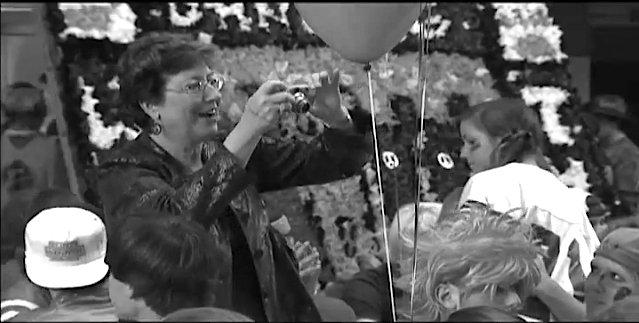Born in Jackson in 1948, Myra Williams Ottewell, 66, grew up in a manner not uncommon for white children in the days of Jim Crow laws, insulated from the full impact of the goings-on of the era and not fully understanding at the time the situation of black people in the south.
"I was in a bubble like most of my white contemporaries back then," Ottewell said. "I knew black people back then mostly as people who worked for us, like maids, nannies for families, cooks at Girl Scout camps or the janitor at the school. That was my association back then. I went to school never even knowing Lanier High School was so close to mine. Things were just so completely separate. My relations with black Mississippians at that time were warm and cordial and wonderful, but I didn't know any black contemporaries."
Ottewell attended Provine High School in Jackson and went on to Mississippi University for Women, where she first majored in physical education and later switched to media technology. After graduating in 1969, she moved to Vancouver, British Columbia. She found work teaching media technology at Queen Elizabeth Secondary School in Surrie, British Columbia. She taught there for more than 30 years before retiring in 2004.
Some time after her retirement, a teacher friend of Ottewell named Pat Anderson invited her to come and speak to the students in Anderson's class after showing them the movie "Mississippi Burning," because she knew Ottewell grew up in Mississippi during the civil rights era.
"I talked to those kids and told them about my relations back then with black people, and they could not believe it, that a white person had good relations with black people back then," Ottewell said. "The film was too powerful for them to believe it was possible. As a teacher, you're not used to kids not believing you."
Some time later, Ottewell was in Jackson for a reunion at MUW when she encountered a black man having a pleasant conversation with a white couple inside a McDonald's. Ottewell approached the black man, Amos Stewart, afterward and asked him about his life in Mississippi. Stewart, who had gone to Chicago in the '60s and come back to Mississippi to retire, told Ottewell, "I have people who will tell nothing but the truth, and in my life I've seen everything but lynching." That encounter, combined with the meeting with the students, inspired Ottewell to make a documentary about race relations in Mississippi.
"Mississippi ReMixed," produced by Ottewell Media, Ltd. in association with Mississippi Public Broadcasting, contains rarely seen archival footage and interviews with civil-rights leaders, everyday citizens and high school students. In the film, Ottewell documents her own journey back to Mississippi to face harsh race realities that she was shielded from as a child. The film connects the past with the present, showing how the state's white-supremacist past created unequal conditions of today.
Ottewell hopes the film will show viewers first-hand that transformation is possible in Mississippi.
"The facts of the film are true," Ottewell said. "I went back to Mississippi to show what the state was like for people who were there in the civil rights era, and how much it has changed. In going back, I got to talk with and hear people's stories that I had never heard in first person.
"I spoke with Dolphus Weary, who was the head of Mission Mississippi at the time I interviewed him. He told me a story about how his (white) neighbor moved the fence post on his property and stole 5 acres of land from him. Seeing him and his determination to heal racial wounds and forge a better Mississippi was truly inspiring to me.
"I asked to visit James Meredith, and he asked to be called J.H., saying, 'I created James Meredith, and he served his purpose.' I found him to be very warm and open. He answered my questions, but you really have to dig to get at the foundations of his answers. It takes a while to understand his message, which has been consistent for all these years, that black Americans—he would never say African Americans—should be full citizens and have all the rights and responsibilities of citizenship."
One of the most moving experiences Ottewell had in making "Mississippi ReMixed" came when Gene Edwards at Mississippi Public Broadcasting offered to give her a film crew to cover the honorary graduation of the Burglund High School class of 1962. In 1962, three students from McComb went into the whites-only waiting room at a Greyhound bus station and got arrested and expelled for it. One student asked later at an assembly if Brenda Travis, one of the students, was getting expelled. The principal demanded that whoever asked the question come see him in the office, and the whole student body walked out of school in protest. All those students had to sign a pledge saying they wouldn't demonstrate anymore or they would be expelled. None of them would, and they were all expelled and couldn't attend school anywhere in Mississippi from October when it happened to the end of the school year.
Travis was the commencement speaker at the honorary graduation ceremony, and at the end of it, a white man named Randall O'Brien walked up to the microphone, took her hand and said, "When I was 11, you became my hero." He had driven from Texas to give Travis his bronze star from Vietnam. He told Travis, "You had to fight for your country within your own country, and no one should have to do that."
"Brenda and I have become dear friends," Ottewell said. She calls me 'sistah,' and we communicate often. She is no longer angry; she has forgiven and is at peace with God."
More than 60 public-television stations nationwide will broadcast the program.
"I'm thrilled that my documentary is going to be shown on so many stations," Ottewell said. "After these many years that I've been working on it, it's very exciting to see it broadcast nationwide. I want people to watch it with a diverse group with them, and to have a meal and discuss it afterward. For me, that would be the most wonderful thing that could happen."
"Mississippi ReMixed" is showing Sunday, Feb. 16, at 5 p.m. on MPB's channel 29 in the Jackson area. For more information visit the "Mississippi ReMixed" website.
More stories by this author
- New CSET Atrium Dedication and College of Business Donation at JSU, MSU ERDC Day
- JSU Commencement Speakers, National Academy of Inventors Chapter and Marc E. Bassy at MSU
- JSU Getty Images Donation, MSU Research Week and Give Wing at USM
- Alumni Enrichment Institutes an MS Got Soul at JSU, State Science Fair at USM
- JSU Blue Tie Gala and Regions Card, MSU Virtual Reality Grant



